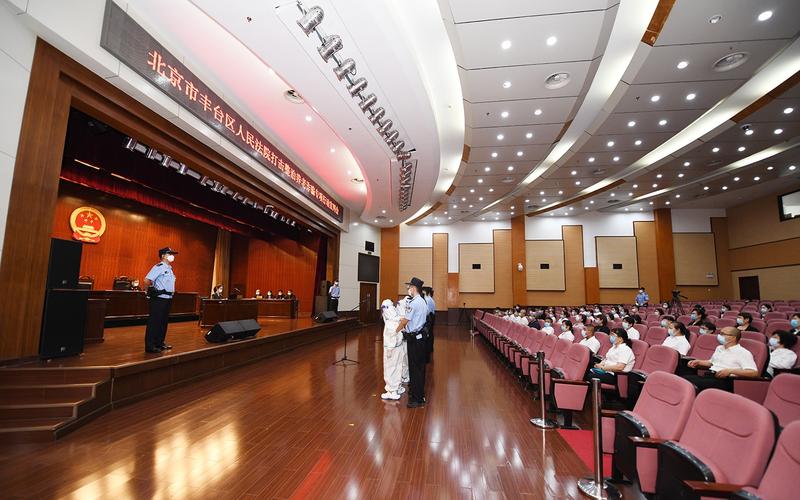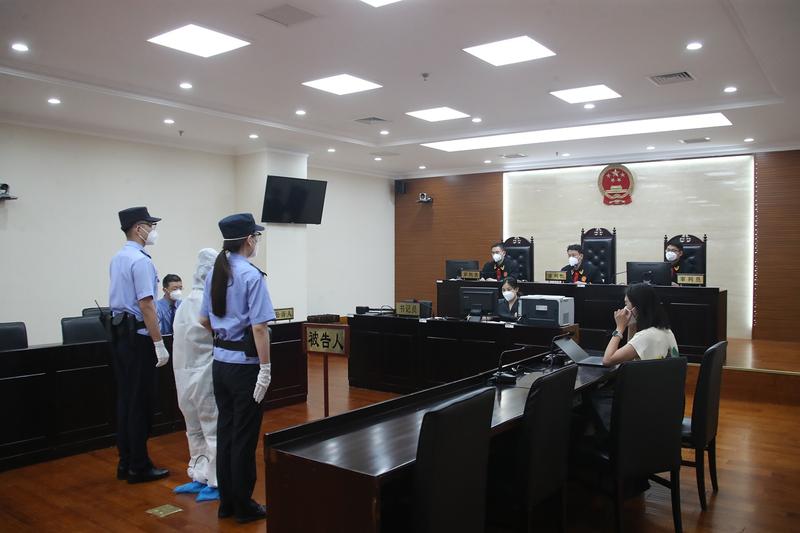The number of swindles, especially those related to works of art, has been rising recently as groups exploit seniors' lack of risk awareness and internet skills. Cao Yin reports.
 Scammers who targeted seniors are tried at the Fengtai District People's Court in Beijing. (PHOTO PROVIDED TO CHINA DAILY)
Scammers who targeted seniors are tried at the Fengtai District People's Court in Beijing. (PHOTO PROVIDED TO CHINA DAILY)
In November, an amateur antique collector surnamed Chen paid more than 10,000 yuan ($1,479) to a company that claimed to be an auction house and said it could help sell her collection of paintings for a high price.
However, when the 60-something Beijing resident went to the offices of the auction house in a plaza in the capital to meet employees, she discovered that the company and people who had contacted her had all disappeared. She waited a while, as the "employees" had told her that it would take time to sell her collection, but by the start of the year Chen realized she had been swindled, so she called the police.
On June 30, police officers in the capital's Haidian district detained seven people suspected of defrauding seniors by setting up a fake auction house and charging high service fees. The suspects are still in detention and investigations are ongoing.
In recent months, police, prosecutors and judges citywide have dealt with a number of similar cases involving victims age 60 and older, as part of a nationwide campaign against groups of swindlers who target the elderly.
 A trial is seen in session at the Beijing Second Intermediate People's Court. (PHOTO PROVIDED TO CHINA DAILY)
A trial is seen in session at the Beijing Second Intermediate People's Court. (PHOTO PROVIDED TO CHINA DAILY)
On Aug 4, a total of 100 people in 15 separate cases received prison terms and fines for cheating seniors in Beijing. They were given sentences ranging from eight months to life imprisonment by the city's eight courts for offenses that included fundraising fraud and bilking people out of their savings. So far, more than 11 million yuan has been returned to the victims.
"Many scammers prefer to commit fraud in the field of art and antiques because they know that a lot of older residents are interested in collecting stamps, commemorative coins or currencies, and paintings and calligraphy, and they want to make more money through the appreciation of their collection," said Shang Dengyu, a judge at the Chaoyang District People's Court in Beijing.
He added that art-related fraud involving older people has been rising over recent years. The victims, mainly age 70 or older, are chosen because they have poor legal awareness and scant knowledge of how to use the internet to verify the information they have been given.
 Judge Chen Shengtao addresses a defendant at the second intermediate court. (PHOTO PROVIDED TO CHINA DAILY)
Judge Chen Shengtao addresses a defendant at the second intermediate court. (PHOTO PROVIDED TO CHINA DAILY)
Art tricks
A recent case Shang dealt with saw 14 defendants receive prison sentences ranging from 30 months to 12-and-a-half years after they were convicted of cheating 160 people out of about 24 million yuan between January 2016 and April 2019 by untruthfully claiming that they could sell works of art. One hundred and forty of the victims were age 60 or older, among whom 20 were age 80 or older, according to Shang.
"The scammers had a clear division of work," he said. "Some were responsible for stealing the seniors' personal information, while others pretended to be auction house employees so they could visit or call the seniors to ask if they had any works of art to sell."
During the chats, the scammers learned about the seniors' financial situations. If a target expressed interest, the swindlers would claim they could help to sell art collections at high prices, and earned large sums of money by charging the victims high service fees.
A few days later, the fraudsters would tell the victims that their artworks had failed to sell, Shang said.
Some of the artworks were later found abandoned in a warehouse, but many were of low value.
Dong Xiaoyu, a judge at the Fengtai District People's Court in Beijing, dealt with a similar case in 2020. "At first, the scammers even organized fake auctions to win the seniors' trust, and then arbitrarily made up prices for the artworks," she said.
"In fact, those responsible for evaluating the prices of the collections had no qualifications, and the auction house was just a small company registered for non-auction purposes."
 A police officer tells seniors how new telecom network fraud works in Yangzhou, Jiangsu province, in October. (SHEN DONGBING / FOR CHINA DAILY)
A police officer tells seniors how new telecom network fraud works in Yangzhou, Jiangsu province, in October. (SHEN DONGBING / FOR CHINA DAILY)
Growing trend
Luo Yong, a judge at the criminal division of the Beijing High People's Court, said many fraudsters focus on swindling elderly people in the field of art because some seniors are eager to know how much their collections are worth, but have little knowledge about auctions or the identification of works of art.
She noted that this type of fraud has been seen more often in recent months.
Sun Jingkun, vice-president of the court in Chaoyang, confirmed the trend, and said the rise is related to the rise in Chinese people's purchasing power and the growth of diverse investment channels. To win the seniors' trust, many scammers took them to visit their "workplaces" in office buildings, displaying supposed business licenses and collections ready to be auctioned, he said.
"But actually those workplaces were just rented by the swindlers, and all the auction-related certificates were either bought on the internet or forged," he added.
 A judge at the Chaoyang District People's Court in Beijing sentences defendants who swindled seniors. (PHOTO PROVIDED TO CHINA DAILY)
A judge at the Chaoyang District People's Court in Beijing sentences defendants who swindled seniors. (PHOTO PROVIDED TO CHINA DAILY)
Shang, the judge from the Chaoyang court, said many of the scammers didn't talk directly about auctions or money with the seniors.
"Instead, they invited the seniors to attend an antique or art exhibition, telling them they would get free gifts if they came," he said.
"When accompanying the seniors to the exhibitions, some scammers asked them if they had seen auction-related television programs, and claimed that some artworks sold on the programs had been provided by their company. All this was designed to relax the seniors' vigilance and strengthen the bonds of trust between them, even though the preparatory work might sometimes take a lot of time."
Dong, from the court in Fengtai, said that handling fraud-related cases involving seniors poses many difficulties.
"Some scammers asked the victims to pay cash to avoid transaction records, and some victims couldn't remember details of the fraud due to their poor memory, and few remembered to save receipts or documents as evidence," she said.
Shang noted that it's hard to recover the financial losses in such cases "because many scammers quickly squandered or transferred the illicit gains". He added that many of the victims became highly stressed or even became ill.
 A police officer gives anti-fraud tips to a senior in Yangzhou in January. (ZHUANG WENBIN / FOR CHINA DAILY)
A police officer gives anti-fraud tips to a senior in Yangzhou in January. (ZHUANG WENBIN / FOR CHINA DAILY)
Ongoing campaign
Sun Lingling, vice-president of the Beijing High People's Court, said that fraud can seriously harm seniors' physical or mental health, so since April, when a related campaign was launched nationwide, courts across Beijing have attached great importance to dealing with such cases.
She said the court has set up a special team to guide judges at the grassroots level to handle such cases, and a work mechanism has been established to receive evidence, review cases and provide people with anti-fraud advice.
As of Aug 4, courts in the capital were dealing with 60 cases in which seniors had been defrauded. So far, 22 have been concluded, Sun Lingling said, adding that more than half of those convicted were sentenced to three or more years in prison.
The courts are also providing more services to crack down on such fraud more efficiently.
"We've provided several channels for the public to report clues, including an e-mail address, a hotline and an online platform," Sun Lingling said, adding that the hotline, 12337, has received 1,144 calls from citizens offering information.
"While continuing to collect evidence, we'll consider naming experienced judges to handle complicated fraud disputes involving seniors to better protect older people's legitimate rights and interests," she said.
Meanwhile, efforts to ensure verdict implementation will be intensified, and handbooks or pamphlets on the prevention of such fraud will also be distributed to communities or families that have senior members to improve their legal awareness, she added.
Contact the writer at caoyin@chinadaily.com.cn


